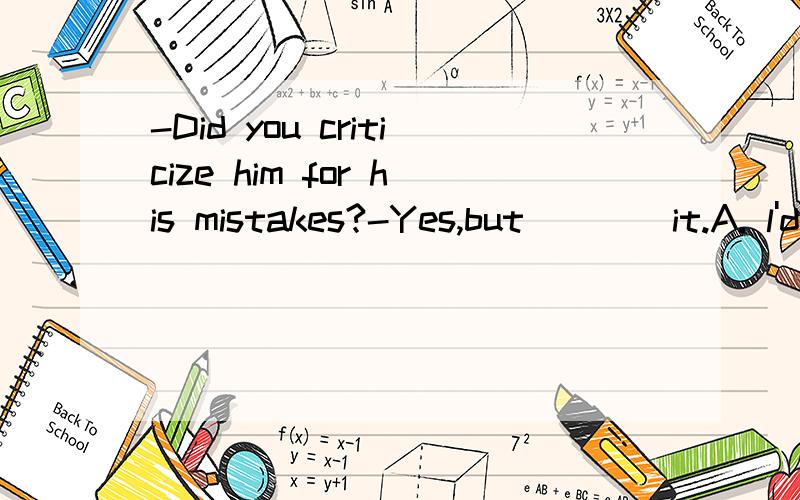-Did you criticize him for his mistakes?-Yes,but____it.A. l'd rather not have doneB.l;d better not
来源:学生作业帮助网 编辑:作业帮 时间:2024/07/31 22:03:29

x��R�o�P�W�.a�� �
L�|2�vp3�Kڋf>u�S��@��m�
���i\)��/�����8�"1{�iڞ�����9�rz9�5�A*(oa�������@kĂ��
lSu]��,?��D�B
��QP醆,�u
�����HG1��t[C9����Y�k�̊�zŹ��_��r:�ߎ����I�tA⯚E�"�VG�?��
�{�b�l��%�۟���[����@�
w�7C����Q� =�����˲�u)˽&����ӛ��Y0Teq�bb��"kh�T7�Ċ�f���b$��Ax)!�^
>�
0g��<�o�����4���E���5����Yp��=6h�ӓ��
v�0,�)����h�d��ҩJ�#�>F]_�m��:��ʣ�ɛ��cAuЈJ��l�Bf�h3��~�:[
�:�T�ѭ%������v|��g�`𐎵Νv���{W�@#��,�Y�lu�gu��.�b-��˪�����p��
-Did you criticize him for his mistakes?-Yes,but____it.A. l'd rather not have doneB.l;d better not
-Did you criticize him for his mistakes?
-Yes,but____it.
A. l'd rather not have done
B.l;d better not
-Did you criticize him for his mistakes?-Yes,but____it.A. l'd rather not have doneB.l;d better not
A
would rather和had rather都表示“宁愿”,在用法上也没有区别.但如果说would rather与had rather完全一样(Longman Dictionary of Comtemporary English如是说),这一说法有争议.其实had rather在现代标准英语中几乎已经不用了.这对我们考试来说是比较重要的,因为一般考题作为标准英语是不用had rather的.
原题是
7) “Did you criticize him for his mistakes?”——“Yes,but it.”
〔A〕 I'd rather not do〔B〕 I'd rather not doing〔C〕 I'd rather not have done〔D〕 I'd rather not did
-Did you criticize him for his mistakes?-Yes,but____it.A. l'd rather not have doneB.l;d better not
Did you h them housework?
英语翻译Who are you to criticize my intentions
Want to criticize me to you loving you missing you really only beloved
英语翻译后面2个单词不是ride you而是criticize you.
帮忙翻译If you make an ass of yourself,don't complain if people criticize you
you can find _______in his exercise book.you must criticize him for not doing his homework
did you
If criticize me can make you rich(有没有语法错误)请详解?
Think that I criticize me to you when missing you ,answer if you will be:Do I also miss you .
if i criticize you,it is___i want you to do better in future选什么if i criticize you,it is___i want you to do better in future.A forB thatC soD what选什么?
Tell me what was (h )at 10:00am.What did you see.
Doing what you believe to be right, even if others mock or criticize you for it.翻译成中文
If you make an assof yourself,do not complain if people criticize you用汉语怎么说这是一条谚语
criticise 和 criticize 区别?
criticize名词形式是什么?
criticize的形容词
几道英语题目 快快快1______many pictures A:did you tookB:what did you takeC:why you took soD: DID YOU TAKE 2____her legA:hoe she brokeB:hoe did she brokeC:how she did breakD:how did she break 4. he fell asleep during the movie______A:while h